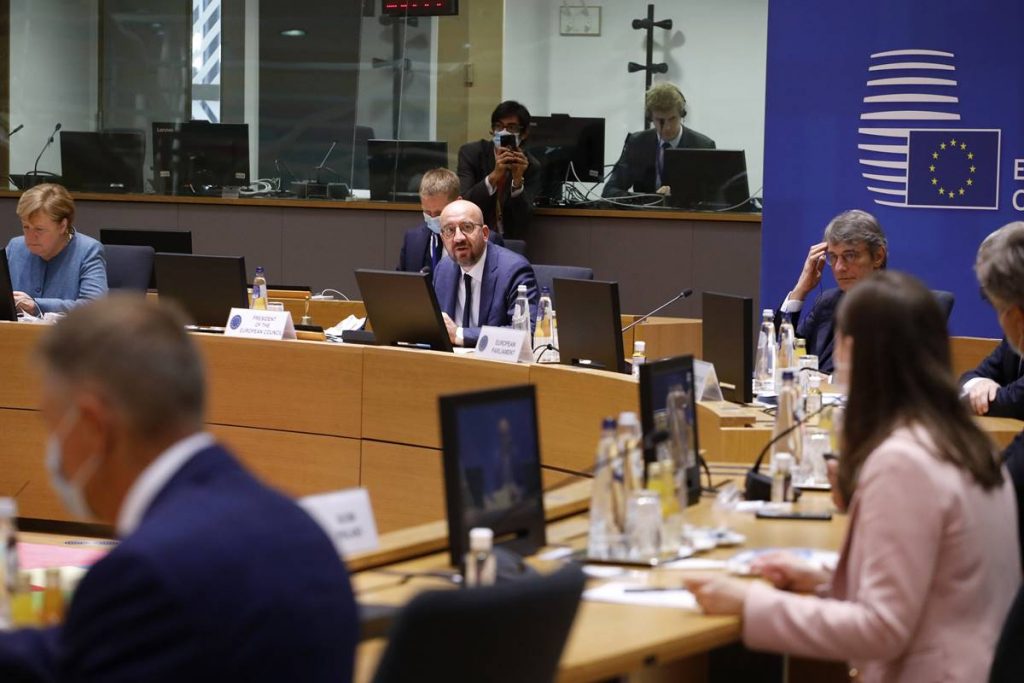 Ramona Coman is a Professor in political science, President of the Institute for European Studies (IEE-ULB) and member of Cevipol (Centre d’études de la vie politique). She is the Coordinator of the Jean Monnet Module Rule of law and mutual trust in global and European governance (599377-EPP-1-2018-1-BE-EPPJMO-MODULE)
Ramona Coman is a Professor in political science, President of the Institute for European Studies (IEE-ULB) and member of Cevipol (Centre d’études de la vie politique). She is the Coordinator of the Jean Monnet Module Rule of law and mutual trust in global and European governance (599377-EPP-1-2018-1-BE-EPPJMO-MODULE)
The German compromise text under negotiations
EU institutional actors are about to restart complex negotiations on the EU’s long-term budget.
Member states are already divided on many issues, but one which has the potential to put in danger the outcome is the rule of law conditionality. The state of play is characterized by increased polarization among member states, whose views seem to be irreconcilables.
In recent years, the rule of law has received ample attention at the EU level as the governments of some member states have put under considerable strain the independence of their judiciaries.
“How did we get here?” is a long story told elsewhere (Coman, 2019). Over the last decades, new tools and instruments have been established to strengthen the Commission’s capacity to deal with rule of law concerns, however with little effects as they did not prevent member states governments from altering the democratic foundations of their political regimes.
The 2018’s proposal of the European Commission
In May 2018, the Commission announced a more ambitious step forward. The Multiannual Financial Framework (MMF) for the years 2021 to 2027 contained a proposal for a ‘Regulation of the European Parliament and of the Council on the protection of the Union budget in case of generalised deficiencies as regards the rule of law in Member States’.
The Commission’s proposal received ample attention and fuelled both supports and disagreements.
The document has the merit of a clear indication about the significance of the rule of law, as very often critics deplore the lack of agreement on what it means. The Commission’s proposal states that the rule of law requires the respect of a set of principles such as legality, legal certainty, the prohibition of arbitrariness, the separation of powers and the effective judicial protection by independent courts, elements which have been identified as key, not only in a series of judgements of the Court of Justice, but also by the Venice Commission of the Council of Europe and more generally in the academic debate.
The proposal also underlines the essence of liberal democracy by reminding that ‘there can be no democracy and respect for fundamental rights without the respect for the rule of law and vice versa’. It insists on the clear relationship between the implementation of the EU budget and the rule of law, as sound financial management can only be ensured by the member states if public authorities act in accordance with the law. In this regard, judicial bodies should act independently from executive and legislative powers and impartially, the proposal defining the independence of the judiciary as the ability for judicial institutions to exercise its functions ‘wholly autonomously, without being subject to any hierarchical constraints or subordinated to any other body’. It also reminds that maintaining the independence of the courts is essential, as confirmed by the second paragraph of Article 47 of the Charter of Fundamental Rights of the EU.
To implement the provisions of this Regulation, the Commission proposed that in the event of ‘generalised deficiencies of the rule of law’, ‘reversed qualified majority voting should be used’ to facilitate the adoption of decisions required to protect the financial interests of the EU.
The European Parliament, largely in favour of a strong link between the EU’s budget and the respect of the rule of law, adopted its first reading position on April 4th, 2019.
Since then, the COVID-19 pandemic increased the complexity of negotiations of the EU’s seven-year MMF. To overcome the serious challenges of the health crisis, a historical € 750 Recovery and Resilience Facility was agreed, not without difficulty by the European Council, in July 21st, 2020 after four days of intense negotiations.
While prior to the pandemic the initial proposal of the Commission was meant to allow the adoption of appropriate measures to be taken ‘where a generalised deficiency as regards to the rule of law in a Member State affects or risks affecting the principles of sound financial management or the protection of the financial interests of the Union’, during the negotiations of the ambitious recovery package some member states insisted on the importance of linking the budget to the respect of the rule of law.
The July 2020 European Council’s conclusion on the rule of law
After the meeting of the European Council in July this year, representatives of member states left Brussels acclaiming a big win after four days of heightened talks and lots of suspense concerning the outcome of a historic deal on a € 750bn coronavirus recovery instrument, Next Generation EU.

Back in the capitals, political leaders celebrated what they saw as being a personal success, in particular the ones opposed to the idea of conditioning EU’s money to rule of law conditions.
The conclusions of the July 2020 European Council specified the introduction of a regime of conditionality to protect the budget and Next Generation EU, in which ‘the Commission will propose measures in case of breaches for adoption by the Council by qualified majority’, adding that the European Council ‘will revert rapidly to the matter’, provision open to interpretation.
Here we are now, in October 2020, in a complex negotiation setting in which the MMF regulation should be adopted under a special legislative procedure, unanimity being required to secure the deal in the Council, the consent of the EP being also required to conclude the decision-making process.
To achieve this, the own resource decision, to increase the EU budget, requires a unanimous agreement for adoption in the Council, an opinion from the EP as well as ratification by all EU member states, according to their institutional provisions. Unanimity prevails and all of this is negotiated together with the ‘Regulation of the European Parliament and of the Council on the protection of the Union budget in case of generalised deficiencies as regards the rule of law in Member States’, which is adopted under the rules of the ordinary legislative procedure and needs a weighted majority of member states.
This complex framework of negotiations gives to each member state the possibility to block the process and to try to satisfy all its interests without concessions.
As declared by Mateusz Morawiecki, ‘without the agreement of Hungary, without the agreement of Poland, without the agreement of the Visegrad Group, nothing will happen’ (FT, July 22nd, 2020).
Before the European Council in July already, the Hungarian Parliament – which is dominated by FIDESZ members – declared that the country will withhold its consent of the EU recovery plan if there is a proposal to link the funds to rule of law conditions (EURACTIV, October 1st, 2020).
The compromise proposed by the German Rotating Presidency
The MMF has been discussed by member states since 2018. Some have argued that it was possible to conclude negotiations under the Romanian rotating presidency of the Council in 2019. The Covid-19 pandemic added more complexity to the matter and all the eyes are now on the German Rotating Presidency, that is expected to not only find a solution, but also conclude these files by the end of its six-months mandate.
On September 28th, 2020, the Council adopted its negotiating position on the rule of law conditionality, drawing on a compromise text put forward the German Rotating Presidency of the Council. The German compromise on the table extends the provisions regarding the respect for the rule of law to the ‘Next Generation EU and through loans and other instruments guaranteed by the EU budget’.

This proposal received the support of a qualified majority of Member States at the level of COREPER, as reported by Agence Europe (September 30th, 2020).
To look at the bright side, the German compromise text is a step forward considering that the Commission’s proposal on the rule of law conditionality goes back to May 2018.
It is also clear that the German Presidency is trying to fulfil its role as mediator and honest broker, seeking to avoid ‘running into a blockade in the overall budget negotiations’, as declared by the German Ambassador to the EU, Michael Clauß to Agence Europe September 30th, 2020).
For diplomats who were waiting from quite a long time to see some progress on this matter, the document is a “a reasonable starting point for negotiations’ (POLITICO, September 28th, 2020).
But…
The compromise text weakens the Commission’s proposal from 2018 in many ways.
Three main aspects of the compromise text deserve attention as they appear to lower the expectations of those in favour of a strong rule of law mechanism.
- The German compromise text brings a series of modifications to the Commission’s proposal with regard to conditions for the adoption of such measures, making them vaguer and subject to interpretation. While, for the sake of clarity, the 2018 proposal of the Commission detailed what was meant by ‘generalised deficiencies as regards the rule of law’ affecting of risking to affect the principle of sound financial management, the German compromise changes the wording. It replaces the expression ‘generalised deficiencies in the member states as regards the rule of law’ with ‘breaches of the principles of the rule of law’, terminology which is closer to the provisions of Article 7. The risk is no longer a condition to take action, while from an economic point of view when there is a risk, action should be taken without delay.
This is a step back. In other words, the scope of the proposal is limited to the ‘management of the budget’, as ‘breaches of the rule of law’ is open to interpretation.
- The measures to be adopted in case of ‘breaches of the principles of the rule of law’ and the procedure to adopt them remain to be determined. These measures should include ‘the suspension of payments and of commitments’, as well as ‘the suspension of disbursement of instalments of the early repayment of loans’.
In terms of procedure, the German compromise text gets rid of the provision stating that decisions should be adopted by reversed qualified majority voting, which is seen by observers as another way of weakening the initial text. A reversed qualified majority would be stronger than a qualified majority vote.
The main steps of the procedure are maintained with some additions, such as:
Article 5 of the compromise texts details the procedure as follows: The Commission should send a notification to the member states concerned, including ‘the factual elements and specific grounds on which it based its findings’. The member state can submit its observations in response to the Commission’s concerns regarding the ‘breaches of the principles of the rule of law’.
The German proposal changes the time limits at each stage of the procedure.
While it was already proposed by the Commission that the member state concerned could make observations within a specified time limit, the German compromise increases this time frame from 1 to 2 months from the date of the notification addressed by the Commission.
Where the Commission considers that the member state does not address its concerns, it shall submit a proposal for an implementation act to the Council, ‘within one month of receiving the Member State’s observations or, in case no observations are made, within one month of the time limit specified by the Commission’.
The decision is adopted by the Council. The German compromise includes a time limit of one month, ‘which in exceptional circumstances can be extended up to three months.
The Council may amend the proposal and adopt the amended text as a Council decision acting by qualified majority.
- The German compromise text introduces also an ‘emergency brake’ – also open to interpretation – whereby the matter can be referred to the European Council, resulting in a decision delayed by up to three months.
The proposal states that:
“if exceptionally, the Member State concerned considers that there are serious breaches of the above principles it may request the President of the European Council to refer the matter to the next European Council” (…) and “no decision (…) should be taken until the European Council has discussed the matter”.
The German compromise text adds new evidence of the empowerment of the European Council, for instance, by acknowledging the ‘guidance provided by the European Council’. This institution created to decide the overall direction of the EU seems to play a role in administrative matters such as the protection of the interests of the EU budget, which although sensitive, can be dealt with by other EU institutions. The role of the European Council in this procedure is probably also a reflection of Angela Merkel’s view, a reminder of her speech at the College of Europe in November 2010, in which she praised the new Union method.
This ‘emergency break’ is another source of ambiguity as the member state concerned can short circuit the Commission and the procedure detailed before to privilege a discussion at the level of the European Councill. Members of the European Parliament fear that this will be another rule of law tool that the Council won’t use, as declared by Daniel Freund, German MEP from the Greens, reported by (POLITICO, September 28th, 2020).
Impossible negotiations?
Representatives of Sweden, Finland, Denmark, the Netherlands and Belgium have already deplored the steps back made by the German Presidency, calling for a ‘more robust mechanism’, closer to the Commission’s initial proposal which included a qualified ‘reverse’ majority of Member States (Agence Europe, September 30th, 2020). According to the Dutch authorities, the proposal on the table does not reflect the July agreement reached by the European Council: ‘Limiting the Commission’s room for manoeuvre is a mistake and it amounts to changing the treaties through the side door’, the source declared for Agence Europe (September 30th, 2020).

Poland and Hungary have threatened to block the process. The debates coincide with the publication of the first Annual Rule of Law Report by the European Commission in September and new struggles between the Commission and the Hungarian Prime Minister, Viktor Orban, who sent a letter to Commission President Ursula von der Leyen, in which he said his government would suspend ‘all political contacts’ with the European executive values and transparency chief Věra Jourová over her comments that Hungary was an ‘ill democracy’ (EURACTIV, October 1st, 2020).
Will the European Parliament be able to make the proposal stronger considering the heightened divisions in the Council? To be continued…
Before you go… Previous articles on the subject on our blog:
Photos | Copyright: European Union




